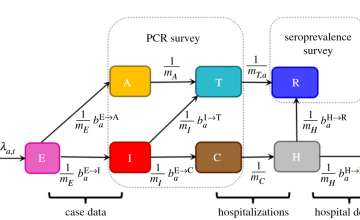PhD
Biomathematics and Statistics Scotland
JCMB, The King's Buildings,
Peter Guthrie Tait Road,
EDINBURGH, EH9 3FD, Scotland, UK.
Research interests
I originally trained as a physicist, and, via jobs in America, England and the Roslin Institute in Scotland, ended up with a permanent job in BioSS in 2020.
I am primarily interested in developing statistically sound approaches to parameter inference in dynamic and spatio-temporal stochastic models. As part of the Scottish COVID-19 Response Consortium (SCRC), I spent much of 2020/21 developing a nationwide inference algorithm to analyse the pandemic.
My previous theoretical work has largely focused on population-level and individual-level dynamic process-based models using and developing a variety of techniques: data augmentation MCMC, particle methods, model and posterior-based proposals, multi-temperature MCMC, novel ABC methods and reliable approaches to model selection.
These have allowed me to investigate, among other things, the genetic basis for epidemiological traits (specifically the susceptibility, infectivity and recoverability of individuals) using data from disease transmission experiments for aquaculture and livestock diseases, model disease spread in wild badger populations as well as perform phylodynamic analyses of pathogens themselves.
Software tools
I have a keen interest in developing software tools to allow sophisticated inference techniques to be readily available to the wider scientific audience:
BEEP (Bayesian Estimation of Epidemiological Parameters) – A general-purpose software tool for simulating and performing inference on compartmental models from population level data. BEEP incorporates a variety of inference methods (e.g. ABC-SMC, PMCMC, DA-MCMC) as well as a newly developed approximate method (ABC-MBP).
BICI (Bayesian Individual-based Compartmental Inference) – Compartmental models have long been used as a means of understanding the collective dynamics of interacting agents, with notable applications in epidemiology and ecology. BICI allows for arbitrary compartmental model specification (using an easy point and click interface) and performs simulation and/or inference using individual level data.
SIRE (Susceptibility Infectivity and Recoverability Estimation) – Three key epidemiological host traits affect infectious disease spread: susceptibility (propensity to acquire infection), infectivity (propensity to pass on infection to others) and recoverability (propensity to recover quickly). Disease control strategies aimed at reducing disease spread may, in principle, target improvement in any one of these three traits. This software tool allows for simultaneous estimation of individual genetic and treatment effects on these host traits.


